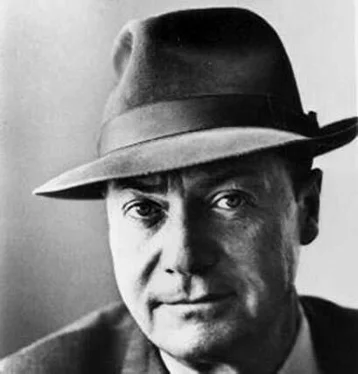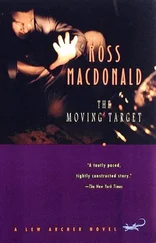“That isn’t what he told me,” the woman cut in. “He said that he was her uncle by marriage, that he’d made some money and wanted to help her with it.”
“Now I know he’s a liar. He was probably lying to both of us. When his first story didn’t work on you, he changed it for me.”
She touched my arm. She wasn’t a small woman, but she had a hummingbird touch, light and vibrating and brief. “What do you suppose he really wants with her?”
“Nothing good, in my opinion. Rose would know.”
It was a question. She seemed embarrassed by it, and she let the embarrassment narrow into suspicion. “I fail to understand your interest in all this, or why you’ve come to me. What do you hope to gain?”
“Nothing. I like to sleep nights. That means that in the daytime I have to follow through–”
She cut me short: “On whose account are you here?”
“My own. And Rose Breen’s.”
“Do you know her?” she said sharply.
“I never heard of her until this morning. But I thought if she’s available I’d like to talk to her.”
“On what subject?”
“Joseph Barr. I thought I’d made that clear. He’s dangerous – dangerous to anyone and especially to a woman that he’s been dreaming about for fifteen years or so. He may be an escaped mental patient or convict–”
“And you may be a very imaginative man.”
“I try to be. The things that happen in the world can be pretty fantastic, and I try to stay attuned.”
She was not amused. The confusion in her eyes was affecting the rest of her face. Her beauty was loosening, coming apart like an overblown flower. I asked her the direct question:
“Mrs. Leverett, is Rose still working for you?”
“She certainly is not. Rose Breen was only with me a total of two or three months. She left fifteen years ago under circumstances that I don’t care to dwell on.”
“Circumstances?”
“I was ill at the time, and she left me without notice.” Her look was almost malevolent. The people in Foothill Drive took their servant problems very seriously. Such things happened to the emotionally unemployed.
“Is Rose still living in Santa Teresa?”
“I’m sure I wouldn’t know.”
“Who would?”
“I can’t think of anyone. Not anyone.” She put on her wide hat and tied it under her chin as if it might help to hold her face together. “Now if you’ll excuse me, there are some instructions I must give the cook.”
“Do you mind if I wait for your husband?”
“I see no point in it.”
“But do you mind?”
“Wait for him if you like.”
She left me standing and walked towards the house. Her heavy grace was heavier and less graceful. She went in. I got back into the car, wondering what had happened to the conversation. We’d been getting along fairly well, I’d thought, then suddenly we weren’t communicating. I hoped I wasn’t losing my fine interrogatory touch.
I had another chance to test it, right away. The young man in blue came out of the house and down the drive. In worn and faded Levi’s and sneakers, he looked like the assistant gardener, or somebody playing the role of assistant gardener. He walked like a zombie, scuffing his feet in the gravel as if he had poor contact with reality. His intense dark gaze seemed to be fixed on another world than this one, not necessarily a better world.
The pressures of this one had stretched the brown skin over the lumpy bones of his face. His hair was short and stood up.
I saw when he reached the side of the car that he was very tall, taller than I was by an inch or two, and about half as wide.
“You’ve upset Mother,” he said tightly.
“I’m sorry. I didn’t mean to.”
“She’s very upset. She went into her room without even speaking.”
“She upsets easily.”
He considered this proposition. “Mother has had enough trouble. I don’t want her bothered.”
“I have no intention of bothering her.”
“What are you doing camping in the driveway?”
“I want to talk to your father.”
“Leverett is not my father. Leverett is my stepfather.” He leaned over to peer in at my face. His eyes were burning black. “Is that clear?”
“Leverett is your stepfather.”
“My cruel stepfather from the Siberian steppes. He’s helping me up the stepladder of success, step by step.”
“Is that supposed to be a joke?”
“A non-joke. You can un-laugh if you like.”
I un-laughed. He grinned mirthlessly in at me. “What do you want to talk to him about?”
“Rose Breen. If you’re Peter Leverett–”
“Chantry. Peter Chantry. Is that clear?”
“You’re Peter Chantry. I understand a girl named Rose Breen looked after you for a while when you were a small boy. You may not remember her.”
“I do, though. I remember her very well. Rose treated me very well. She used to do a lot of clowning around. She taught me to swim in the pool. She even got me started reading, mirabile dictu .” The memory softened his eyes. They needed softening. He almost smiled.
“ Mirabile what?”
“ Mirabile dictu . It’s a Latin phrase. Rose and I had a wonderful time together – the best time that I ever had in my life. I’ve been thinking about her a lot these last couple of days. I sat up most of last night thinking about her.” He added confidentially: “I do my best thinking at night.”
He appeared to be about twenty, but he acted younger. Still I had the impression that he was playing a role – assistant gardener, village idiot, family fool – behind which his intelligence lay in ambush. I’d run into similar fronts in other young people who felt displaced at home.
“Maybe I better come back around midnight or something. We’ll synchronize our watches.”
“Mine is already synchronized,” he said, deadpan. “What’s your name?”
“Lew Archer. I’m a private detective. Is that clear?”
He looked at me in boyish confusion. Then he decided to laugh. Or un-laugh. “I’m sorry, but I don’t like to be mistaken for Leverett’s son.”
“Where did you pick up the is-that-clear bit? Television?”
“Leverett. He used to say it all the time. I started saying it back to needle him. It must have crept up on me. Things do.”
“Tell me more about Rose. Sit in the car if you like.”
“No thanks.” But he leaned his arm on the door. “Why is everybody suddenly so interested in Rose? A man was here the other day – it’s what got me started thinking about her. I’d hate to think of that Barr person catching up with Rose. He isn’t really her uncle, is he?”
“He’s not her uncle. I don’t know who he is.”
“What does he want with her?”
“She’s the one to ask. Do you have any idea where she is, Peter?”
“How would I know?” His face had gone blank and stupid. “She may be dead, for all I know.”
“But you don’t think she is.”
“I don’t want to think she is.”
“How did the idea come up?”
“Everybody I care about dies or goes away.” He kicked the earth, spraying the car-door with gravel.
“When did you last see her?”
“I was about five. She took off without even saying goodbye. I felt very badly about it. I cried. That was about the last time I ever cried. You see, she treated me like a mother. My own mother never did. Rose took me to her place and we used to pretend that I was her little boy.” His voice cracked with self-pity.
“Didn’t she live in?”
“She did at first. After Father came home from the war she moved into her own place, down the road. I suppose there wasn’t room for her in the house. But you’d think there would be, wouldn’t you?” He looked at the house. “It’s a big house, and there was – there were only Mother and I for a long time after that.”
Читать дальше












